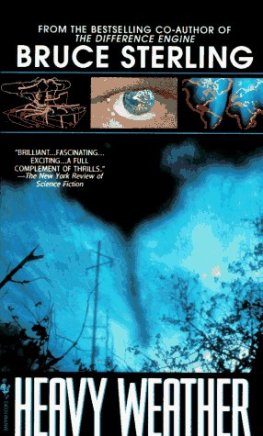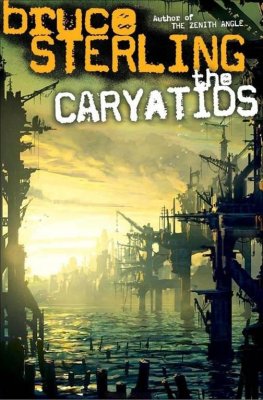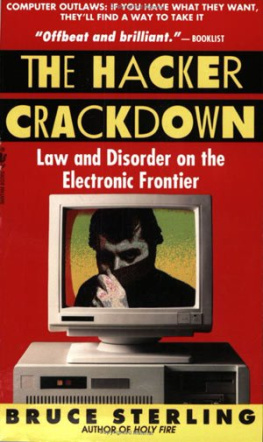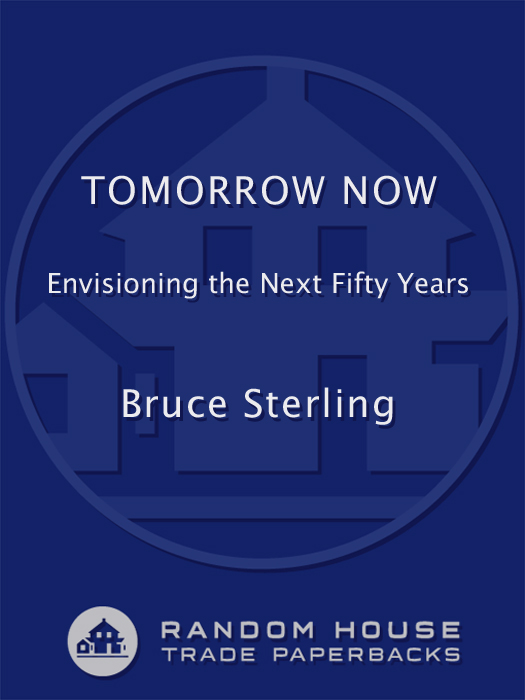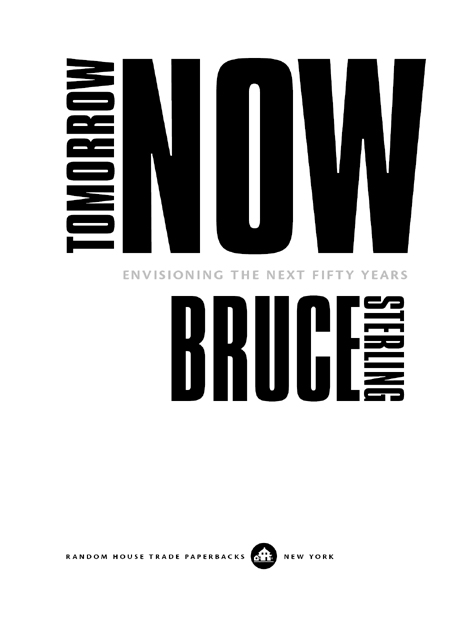[Sterling] writes in a plain, conversational style, which he interrupts with striking, apothegmatic formulations, i.e., sound-bites. Some of these formulations sound almost too flip, but nearly all of them also seem correct or close to it. Entertaining and stimulating.
The Washington Post
[Tomorrow Now] maintains Sterlings customary quick pace. His other strong points are also in evidence: a truly global world view; clear-eyed assessment of new technologies and their impacts; and a wit as tart as a food processor full of lemon rinds. A canny guesser, Sterling, with his entertaining style and unorthodox mindset, is a great guide to tomorrow. You may or may not agree with his conclusions, but youll be glad you read this book.
The Seattle Times
Sterling is in the business of holding up a mirror to today and locating tomorrow somewhere in the reflection. When he gets the angle just right, the effect can be dazzling. Its a semi-scholarly work of nonfiction by a man who takes the future seriously. Funny, fascinating Stage Seven: Mere Oblivion is explosive apocalyptic stuff.
The San Diego Union-Tribune
The most striking aspect of this volume is its optimism. Sterling doesnt settle any issues, but he makes you think harder about the literal meaning of life and death. Throughout, Sterling infuses deep topics and moral quandaries with wit and insight.
San Jose Mercury News
Sterling provides an informative, straightforward and relatively jargon-free discussion of critical issues. He has interesting things to say about education, politics, the economy and terrorism. His examples are drawn from his wide reading, as well as his personal experiences as a writer and father. And he doesnt hide his own quirky interests and obsessions.
The Oregonian
Transforming hype into epigrams and forebodings into witty deconstructions of todays moral panics A tour de force Well above ephemeral trend-spotting, Sterlings high-IQ futurism is sure to be devoured by hackers and the remaining Silicon Valley CEOs.
Kirkus Reviews
Sterlings breezy tone and insightful speculations reposition this cyberpunk hero as a fun hybrid of Robert Kaplan and Faith Popcorn, ready to join the punditocracy and reach out to a broader readership.
Publishers Weekly
2003 Random House Trade Paperback Edition
Copyright 2002, 2003 by Bruce Sterling
All rights reserved under International and Pan-American Copyright Conventions. Published in the United States by Random House Trade Paperbacks, an imprint of The Random House Publishing Group, a division of Random House, Inc., New York, and simultaneously in Canada by Random House of Canada Limited, Toronto.
R ANDOM H OUSE T RADE P APERBACKS and colophon are trademarks of Random House, Inc.
This work was originally published in slightly different form in hardcover by Random House in 2002.
Library of Congress Cataloging-in-Publication Data
Sterling, Bruce.
Tomorrow now: envisioning the next fifty years / Bruce Sterling.
p. cm.
eISBN: 978-0-307-49199-2
1. Social prediction. 2. Twenty-first centuryForecasts. I. Title.
HM901.S74 2002
303.49dc21 2002024801
Random House website address: www.atrandom.com
v3.1
CONTENTS
INTRODUCTION
I n normal circumstances, Im not the sober, serious futurist that you will see in this work. This is me as a full-blown pundit, a brow-wrinkled journalist who attends the Davos Forum, networks with Californian corporate forecasters, and mourns the tragic loss of the Congressional Office of Technology Assessment. Most of the time I really dont care to work that hard. Because Im a science fiction writer.
By trade, science fiction writers are pop entertainers. Science fiction can manage just fine without the future. Quite often the future is a drag on our market. The top contemporary earners in science fiction arent futuristic works, theyre fantasiesStar Wars, Harry Potter, and Lord of the Rings. These mass entertainments have mythic plot structures, with cool special effects and fabulous set designs. People eat that stuff up, and the spin-off toy-collectible market alone is hugeyet it has nothing to do with tomorrows pressing realities. This book most definitely does; it assaults the future head-on. It is nonfiction, although people who predict the future must always tell fictionseven if they happen to tell the truth.
Let me offer a personal example. Back in 1989 I wrote a science fiction story called We See Things Differently. This twenty-first-century story is narrated by a suicidal jihad Arab terrorist from Egypt who travels to Florida to kill a prominent American political figure by secretly poisoning him with a biowarfare powder.
Come late 2001, and events of that ilk were in headlines all over. In the year 2001 I got quite a lot of e-mail about that story, much of it from people who were genuinely alarmed by my prescience. But I myself wasnt much alarmed. I didnt bother to tell them about the many other science fiction stories Ive written that dont involve any suicidal Islamic terrorists. For as this book makes clear, although Im rather thoroughly aware of Islamic terrorists, I dont consider them that big a deal in the long run.
Sci-fi is supposed to be entertainment, yet futurism is a serious enterprise. Let me pull you behind the ol Wizard of Oz curtain and explain how futurists go about their work.
First, you have to find somebody wholl pay you to do it. This stark reality immediately splits futurism into interest groups.
In corporate futurism (which pays the best), youre concerned with new markets and new products. In government futurism (the most dignified), its about investment in basic R&D, the changing demographics of the political base, and new demands for bureaucratic public service. Military futurism is about new weapons platforms and new security threats: thinking the unthinkable, as Herman Kahn aptly used to put it. Police futurism (and yes, there are a few police futurists) is about figuring out how to apprehend, prosecute, and jail people involved in wicked activities not yet formally defined as crimes. Ethical futurism is about the moral conundrums posed by possible future actions such as human cloning and genetic alteration. And so forth.
The future is the largest of all possible subjects. It encompasses everything on the far side of the ever-ticking clock. But professional futurists tend to work within narrow parameters. In Tomorrow Now Im combining approaches. Thanks to my independent economic base as a pop entertainer, I can mess with the future in seven different ways all at once.
Someone who could give you a detailed, fully accurate portrait of tomorrow would not be human but a wizard. Such a prophet would also be extremely dangerous and very uncanny, and would have to be arrested. I dont pretend to be one here. At its best, futurism does what history can do. It suggests better decisions about our own actions in the context of the passage of time. Futurism teaches how to recognize profoundly changing circumstances. It offers paths forward that might have reasonable prospects of success. It offers humanity some fresh mistakes.
We humans can never tackle time in its raw form. We can tackle only our perceptions of time: the language, the mindset, the sensibility, and the period frame of mind. Successful futurism assembles evidence of trends to aim at paradigms. Futurism is an art of re-perception. It means recognizing that life will change, must change, and has changed, and it suggests how and why. It shows that old perceptions have lost their validity, while new ones are possible.


